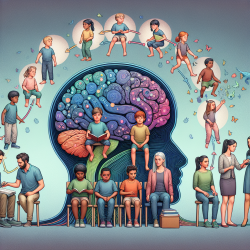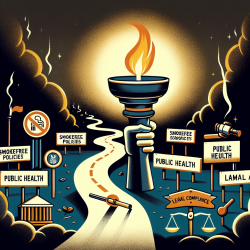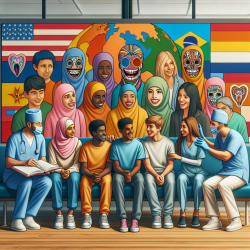Introduction
In the realm of speech-language pathology, data-driven decisions are crucial for creating effective interventions. A recent study titled "Protocol for a pilot randomised controlled trial evaluating feasibility and acceptability of cognitive remediation group therapy compared with mutual aid group therapy for people ageing with HIV-associated neurocognitive disorder (HAND) in Toronto, Canada" provides valuable insights that can be applied to enhance therapeutic practices. This blog will explore how practitioners can leverage these findings to improve their skills and outcomes for children with similar neurocognitive challenges.
Understanding HAND and Its Implications
HIV-associated neurocognitive disorder (HAND) affects a significant portion of individuals living with HIV, with symptoms ranging from memory deficits to impaired executive functioning. These cognitive impairments can lead to increased stress, anxiety, and difficulties in daily activities. The study conducted in Toronto aimed to evaluate the feasibility and acceptability of cognitive remediation group therapy (CRGT) compared to mutual aid group therapy in addressing these challenges.
Key Findings and Their Application
The pilot study employed a randomized controlled trial design, recruiting participants diagnosed with mild neurocognitive disorder form of HAND. The novel CRGT approach combined mindfulness-based stress reduction (MBSR) with brain training activities, while the control group participated in mutual aid group therapy. The primary outcomes focused on feasibility and acceptability, while secondary outcomes included stress, anxiety, and coping mechanisms.
Practitioners can draw several lessons from this study:
- Integration of Mindfulness and Cognitive Training: The combination of MBSR and brain training activities showed promise in improving cognitive function and emotional well-being. Practitioners can incorporate similar strategies into their therapy sessions to enhance outcomes for children with neurocognitive disorders.
- Importance of Group Therapy: Both CRGT and mutual aid group therapy emphasized the value of social connection and support. Group therapy can be a powerful tool in speech-language pathology, fostering peer interaction and shared learning experiences.
- Focus on Feasibility and Acceptability: The study's emphasis on these outcomes highlights the need for interventions that are practical and well-received by participants. Practitioners should prioritize creating engaging and accessible therapy programs for children and their families.
Encouraging Further Research
While the study provides valuable insights, it also underscores the need for further research in the field of cognitive remediation. Practitioners are encouraged to explore the following areas:
- Long-term Effects: Investigating the sustained impact of cognitive remediation therapy on neurocognitive function and quality of life.
- Adaptation for Different Populations: Exploring how these therapeutic approaches can be tailored to meet the needs of children with various neurocognitive challenges.
- Technology Integration: Examining the role of digital tools and online platforms in delivering effective cognitive remediation therapy.
Conclusion
The study conducted in Toronto offers valuable insights into the feasibility and acceptability of cognitive remediation group therapy for individuals with HAND. By integrating mindfulness and cognitive training, practitioners can enhance their therapeutic practices and improve outcomes for children with neurocognitive disorders. Continued research and exploration in this field will pave the way for more effective interventions and better quality of life for those affected.
To read the original research paper, please follow this link: Protocol for a pilot randomised controlled trial evaluating feasibility and acceptability of cognitive remediation group therapy compared with mutual aid group therapy for people ageing with HIV-associated neurocognitive disorder (HAND) in Toronto, Canada.










